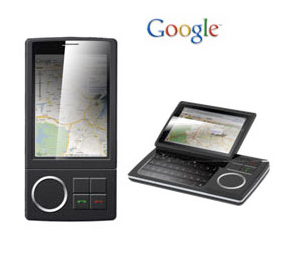ANALYSIS: Behind the "Goo-phone": The world goes mobile
 San Francisco - When Google co-founder Larry Page talked Tuesday about his company's first venture into the world of mobile phones, he joked about how his inner geek loved tinkering with the open source operating system that powers the new cellphone.
San Francisco - When Google co-founder Larry Page talked Tuesday about his company's first venture into the world of mobile phones, he joked about how his inner geek loved tinkering with the open source operating system that powers the new cellphone.
"This is as good a computer as you had a few years ago," said Page as he playfully tossed the device - known as G1 - up in the air.
But underscoring the strategy behind the "Goo-phone," is a deadly serious and highly ambitious attempt by the online search giant to seize what some analysts are already calling the business opportunity of the century.
In the 10 years since it was founded Google has become one of the most powerful companies in the world through its domination of online search and the advertising that accompanies it. The unveiling of the first mobile phone powered by Google signals its ambitious bid to extend its online dominance to the mobile web.
This isn't just a vanity play to appeal to early adopters of flashy gadgets. It's a plan that recognizes that mobile phones are destined, sooner rather than later, to become the most widely used internet access devices in the world. And Google wants to be at the centre of that experience.
"Google's goal is to make it as easy as possible for anyone on any platform to access their services," said tech analyst Carmi Levy. "We are at an inflection point in the market. The battleground of tomorrow is the mobile space."
The new phone, which is manufactured by Taiwanese electronics maker HTC, will be offered initially in the US and Britain, followed next year by Europe. But the Android operating system is open source - meaning that anyone can use it and adapt it - and it is supported by a broad alliance of handset makers, carriers and technology firms.
Thus dozens of Android phones from different companies will hit stores next year, and its major markets may well be in developing countries where mobile phones - not desktop or laptop computers - are expected to be the main internet access devices.
China has more than 600 million mobile phone users and this year it overtook the United States as the country with the largest number of internet users - currently more than 250 million. Over 73 million people, or 29 per cent of all internet users in the country, used mobile phones to get online, with that number growing by 45 per cent in the six months to June, according to the China Internet Network Information Centre.
Last year Lee Kai-fu, Google's president in China, announced that Google was redesigning its products for a market where "most Chinese users who touch the mobile internet will have no PC at all."
As mobile internet use skyrockets in developing countries like Russia, Indonesia, India, Kenya and South Africa, sophisticated mobile services are already popping up. One example, M-PESA is a mobile-payment service introduced by Safaricom Kenya, that allows subscribers to send funds to each other by text message.
The service is now used by around a quarter of Safaricom's 10 million customers. Casual workers are paid quickly by phone; taxi drivers accept payment without having to carry cash around; and money can be sent to friends and family. Safaricom's parent company, Vodafone, has launched M-PESA in Tanzania and Afghanistan, and plans to introduce it in India. Similar services have also proved popular in South Africa and the Philippines.
The experience of having a full-powered internet device in people's pockets is so new that no one can really predict how its use will develop. But by making the software open source and opening a free marketplace for third-party applications Google is betting that its platform becomes the engine of choice for mobile innovation.
"Google is fulfilling a need that is long standing in the market," said Levy. "it is trying to replicated its dominance from the fixed internet to the mobile web and convert the mobile screen into an experience that connects user to an advertiser. Everyone should watch out. It's going to be huge." (dpa)